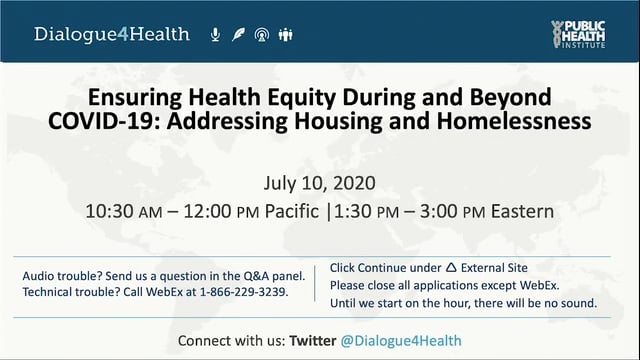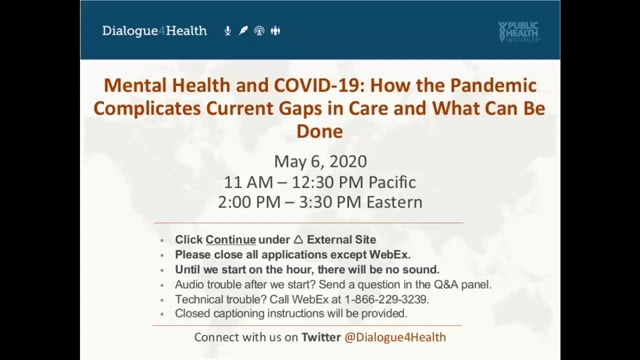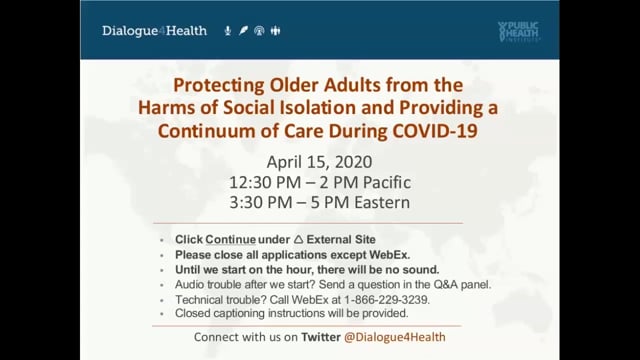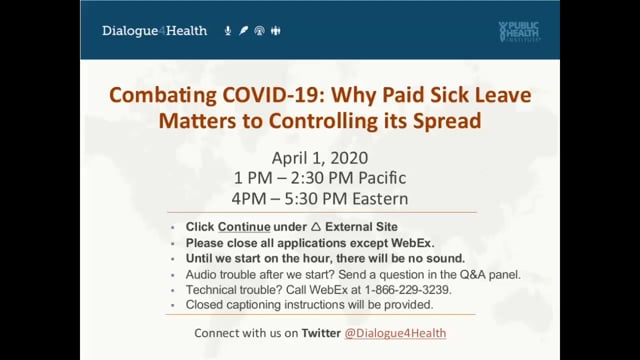
Many Americans struggle to maintain a safe and healthy place to live. People who are housing insecure or experience homelessness typically have poorer physical and mental health outcomes and are at greater risk for infection during the COVID-19 pandemic, in addition to other challenges.
In response, solutions such as providing short-term housing arrangements for newly released low-level criminal justice offenders to rental assistance and freezes on evictions have been put in place to reduce the risk of exposure among vulnerable populations during the pandemic. However, these short-term solutions won’t be enough. Also required are sustainable long-term programs that equitably improve opportunities for individuals to live in safe and affordable housing.
This Webinar highlights the disproportionate and long-existing economic and health disparities among people who are housing insecure or experience homelessness. In addition, the webinar highlights what is currently being done to protect this population during the COVID-19 pandemic, and identify the long-term policy, system, and environmental changes that are needed to advance health equity by effectively addressing housing insecurity and homelessness.

The ongoing COVID-19 pandemic has created new challenges and aggravated existing obstacles to mental health care and well-being. Individuals, families, and communities nationwide are grappling with financial insecurity, increased difficulty accessing mental health and substance use care, and an elevated level of overall stress and anxiety. This pandemic also threatens to widen existing disparities in access, treatment, and recovery for mental illness and substance use disorders. All of this culminates into a possible “second wave” of rising mental anguish, addiction, and social dislocation.
The discussion focused on the unique challenges for mental health in the wake of COVID-19. Attendees learned about current advocacy efforts to improve the mental health system, what specialized resources in response to the pandemic have been released to date, and what else may be needed.

The ongoing COVID-19 crisis presents unique challenges for the public health and aging sectors. While social distancing protects older adults who are at higher risk for complications from the virus, the practice can exacerbate social isolation, a longstanding issue for this population. The needs of older adults must be considered across a continuum of care from primary prevention to post-acute care in the coming months.
Trust For America’s Health Policy Development Manager, Megan Wolfe for a Web Forum to discuss how to address the unique challenges that older adults face while adhering to public health advice to minimize risk of infection. Attendees will learn about the consequences of social isolation, how the aging services sector has adapted its delivery models, and hear about promising practices from the field and the importance of working with public health partners to address the needs of older adults.

This webinar highlights recommendations made in TFAH’s Ready or Not and Promoting Health and Cost Control in States (PHACCS) reports on the important role of paid sick leave in combating infectious diseases, as well as other complementary evidence-based policies that can be adopted by federal, state and local governments and by employers.
Presenters focused on pending federal legislation, states that have adopted laws regarding paid leave, and businesses that are expanding these benefits. In addition, they discussed the potential short-term uses of the recently approved supplemental budget to assist individuals without paid leave when confined to their homes.
Recommended for anyone working in public health, advocacy, school health, community-based organizations, businesses, labor unions, hospitals, health systems, insurers, policy staff, and local and state health officials.

This is the first segment of a web forum series dedicated to highlighting state-level, evidence-based strategies across sectors to improve health. States can improve their residents’ health and well-being, and lower healthcare costs, by implementing a range of policies in sectors beyond healthcare. The Promoting Health and Cost Control in States (PHACCS) initiative focuses on 13 state-level policies that can be adopted and implemented to promote health and control cost growth.Please join this web forum hosted by Trust for America’s Health for a panel discussion with public health leaders as they highlight the current legal landscape of tobacco pricing strategies, the health impacts of tobacco pricing strategies, and how advocates are working at the local and state level to reduce tobacco use.
Every year, smoking-related illnesses cost the United States more than $300 billion, including approximately $170 billion in medical care. However, one of the most effective evidence-based strategies for state policymakers to consider reducing tobacco use is decreasing access to, and increasing the price, of tobacco products.The panelists will also discuss the latest research and public health efforts focused on tobacco control programs. The web forum session will include time for audience Q&A.This web forum is free for all participants. It is recommended for those working in public health, advocacy, education, community-based organizations, faith-based organizations, hospitals, health systems, insurers, and local and state health officials.
Additional Resources:
This is the final segment of Trust for America’s Health’s 4-part web forum series: Taking Action to Promote Health Equity—Using the Lessons from Cutting-Edge Practices to Improve Health and Well Being.
Leadership is an essential ingredient in making lasting change to advance equity and population health. The last web forum in our series will feature two nationally known leaders discussing the connection between racism and health inequity and sharing insights about engaging all members of a community—including your own organization—in the common purpose of a just society with equitable opportunity.
The web forum speakers are Dr. Gail Christopher, the chair of the Board of Directors of Trust for America’s Health, and a longtime leader in philanthropy and the movement to eliminate discriminatory barriers to progress; and her daughter, Heather McGhee, the immediate past president and now a Distinguished Senior Fellow at Demos and a frequent national media contributor.
For the first time in a national forum, these two inspiring leaders will discuss how change is created at the individual, community, organizational and systems levels. They will offer concrete examples of how leaders can experience “inside out change” in order to be effective equity leaders. They will also focus on our nation’s unfinished work toward racial equity and the need to change the narrative and beliefs that fuel inequities. In addition, Dr. Christopher will discuss the W.K. Kellogg Foundation’s Truth, Racial Healing and Transformation initiative and Ms. McGhee will share insights about Demos’ internal Racial Equity Organizational Transformation process, what she’s learned from her friendship with a now-reformed racist C-SPAN caller, as well as Demos’ new research on how to talk about race and class.
This event is recommended for anyone working in public health, advocacy, community-based systems, education, faith-based organizations, hospitals/health systems, insurers, local and state health officials, and housing.
This is the third installment of TFAH’s 4-part Web Forum series: Taking Action to Promote Health Equity—Using the Lessons from Cutting-Edge Practices to Improve Health and Well Being.
Ensuring lasting community health and equity calls for innovation, collaboration, and a multifaceted approach that addresses underlying determinants of health, including discrimination and poverty. By adopting strategies that include criminal justice reform, local purchasing, job training, community investment, and other endeavors, W.K. Kellogg-funded organizations are contributing to efforts that create equitable opportunity and better meet broader community needs, priorities, and challenges. Please join us for an engaging Dialogue4Health discussion during which leaders and partners describe why they have taken this approach and how it benefits not just their organizations, but the surrounding areas they serve, and ultimately improves health equity.
This event is recommended for anyone working in public health, advocacy, community-based systems, education, faith-based organizations, hospitals/health systems, insurers, local and state health officials, and housing.




